ISTANBUL -- Ahmed Hassan Makur is a Syrian refugee who has for the last four years dwelled in Turkey’s Nizip Temporary Accommodation Center near Gaziantep north of the border with Syria. When the war erupted in his country in 2011, he escaped with his family and found refuge in Turkey that has welcomed nearly 3 million of his compatriots.
“Thank God, everything is good. We are quite happy here. Turkish people are very hospitable,” the 50-year-old man told reporters in mid-May in the two-room container where his family of five lives.
His wife, wearing a colorful hijab, served freshly brewed Turkish coffee for the journalists. A local interpreter advised finishing the bittersweet drink, as a sign of returning their hospitality.
“We want to return home once Syrian President Bashar Assad and the Islamic State are defeated,” he sighed, looking at the ceiling. “It was easier to come to Turkey four years ago. We miss everything back home, in sadness and happiness alike.”
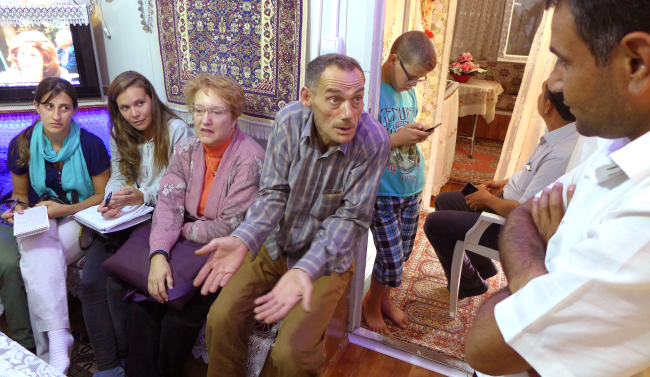 |
Ahmed Hassan Makur (center), a Syrian refugee who lives in Turkey’s Nizip Temporary Accommodation Center near Gaziantep north of the border with Syria, speaks to journalists from around the world ahead of the World Humanitarian Summit in Istanbul from May 23-24. (Joel Lee / The Korea Herald) |
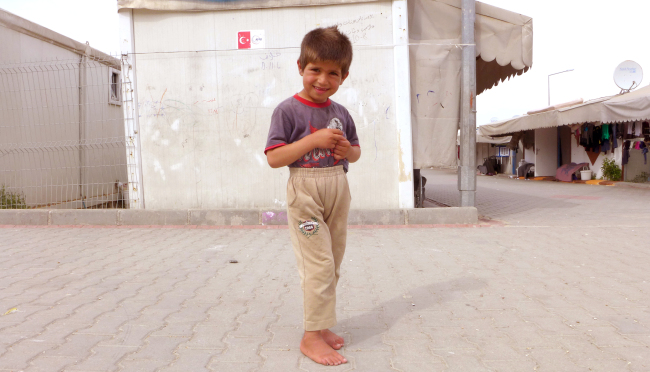 |
A Syrian child saunters in a refugee camp in Turkey near Gaziantep. He is one of 270,000 people housed in temporary accommodation centers across the country, which has received 2.75 million Syrians since 2011. (Joel Lee/The Korea Herald) |
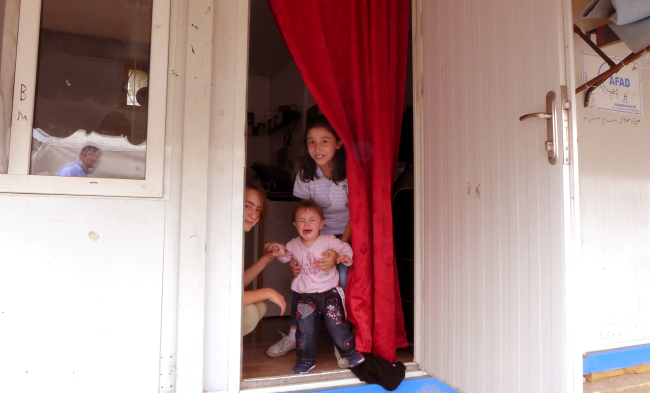 |
Syrian refugees in Turkey’s Nizip Temporary Accommodation Center near Gaziantep north of the border with Syria. (Joel Lee / The Korea Herald) |
Makur is one of 270,000 Syrians who have fled their war-stricken homeland and made new homes in Turkey’s refugee camps, located mostly along the southern border. They are given a temporary protection status, under which they enjoy state-provided services such as housing, food, education, health care and vocational training. The remaining 2.5 million Syrians live and work in cities across the country.
To better cope with the ongoing humanitarian crises and consolidate international coalition, the Turkish government will host the World Humanitarian Summit in Istanbul from May 23-24.
As the United Nations’ first-ever humanitarian summit, initiated by Secretary-General Ban Ki-moon, the venue will gather 5,000 participants, including heads of state, bureaucrats and diplomats, corporate leaders, aid workers, civil activists and affected communities.
The core commitments to be discussed are preventing and ending conflict through political solutions; respecting international human rights laws; enabling and protecting the most vulnerable; finding new ways to strengthen resiliency of distressed people; and substantially increasing and diversifying global financial support.
The conference will attempt to invigorate a global commitment, fleshing out concrete actions and sharing best practices. In particular, ensuring the dignity of the displaced, empowering women and children, bridging the gap between development and humanitarian partners and securing reliable finance will be reviewed.
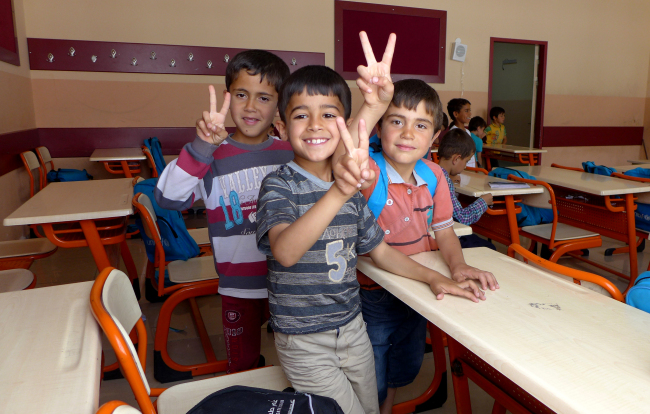 |
Syrian refugees in Turkey’s Nizip Temporary Accommodation Center near Gaziantep north of the border with Syria. (Joel Lee / The Korea Herald) |
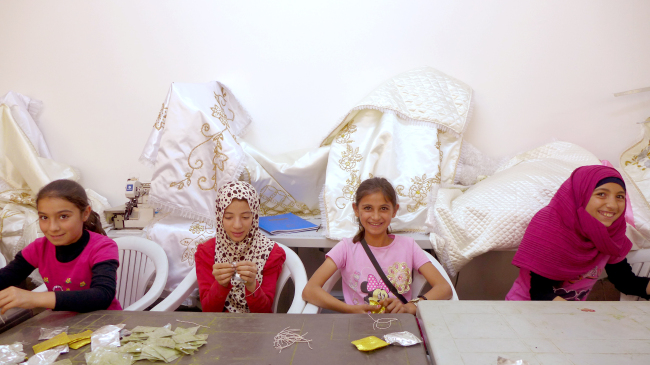 |
Syrian refugees in Turkey’s Nizip Temporary Accommodation Center near Gaziantep north of the border with Syria. (Joel Lee / The Korea Herald) |
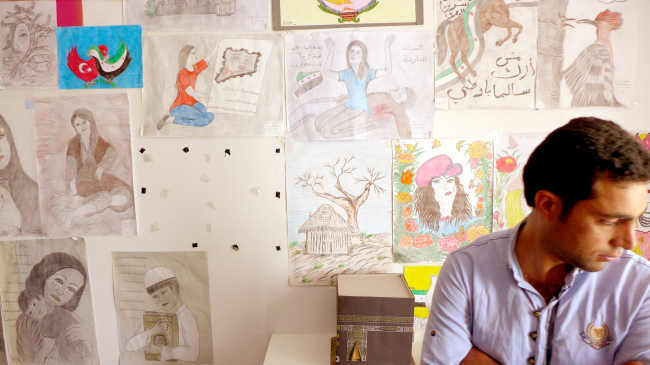 |
Drawings by Syrian refugees in Turkey’s Nizip Temporary Accommodation Center near Gaziantep north of the border with Syria. (Joel Lee / The Korea Herald) |
According to Levant Murat Burhan, deputy under secretary of the Turkish Ministry of Foreign Affairs, financing is a critical issue, as “the world’s economic output is $78 trillion per year, but merely an extra $15 billion is needed to help 125 million people worldwide requiring emergency relief.”
“One major reason for hosting the summit is to address the widening gap between what Turkey can provide and the increasing burden we are faced with,” he emphasized. “We should try to help the displaced help themselves. Building their long-term resiliency would turn them into productive forces of society. We need to properly balance humanitarian assistance with self-reliant capacity-building.”
At the end of the summit, a chair’s summary reflecting main issues discussed and proposals for action will be produced, alongside a document detailing measures and commitments toward the Agenda for Humanity. Secretary-General Ban will prepare a report on the outcomes and strategies, which will be presented at the 71st U.N. General Assembly.
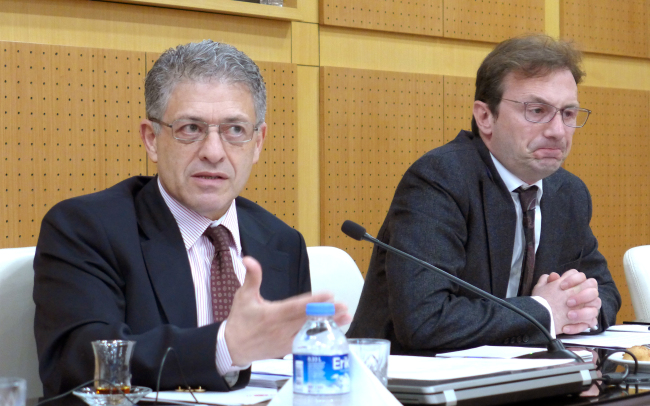 |
Levant Murat Burhan (left), deputy under secretary of the Turkish Ministry of Foreign Affairs. (Joel Lee / The Korea Herald) |
“It is hard to grasp the reality of human suffering in and around Syria from far away, but we can see it very clearly on the ground,” said Dr. Kudret Bulbul, president and associate professor at the Presidency for Turks Abroad and Related Communities.
“The world is totally incompetent in sharing this suffering. Turkey is not a rich country in terms of per capita income, at only $10,000, but we give among the highest humanitarian aids in the world relative to our economy’s size. We are very proud of this fact.”
Turkey, which has assumed the lion’s share of the region’s philanthropic call, has granted 5,000 scholarships to international students, out of which 1,000 went to Syrians last year. Syrian students numbering 5,560 are currently enrolled in Turkish universities studying medicine, engineering, agricultural science and other disciplines at undergraduate, graduate and postgraduate levels. Additionally, 330,000 Syrian children attend schools across the country.
Stressing that humanitarianism is a “common good” of the world, Bulbul argued countries should equally share the burden, as any nation could be embroiled in a crisis.
He mentioned the Turkey-Germany relations, noting Turkey accepted people fleeing Nazi Germany during the WWII, which was followed by many Turks settling in Germany in the 1960s. Once again, Turkey is sheltering those cordoned off by Europe, he pointed out.
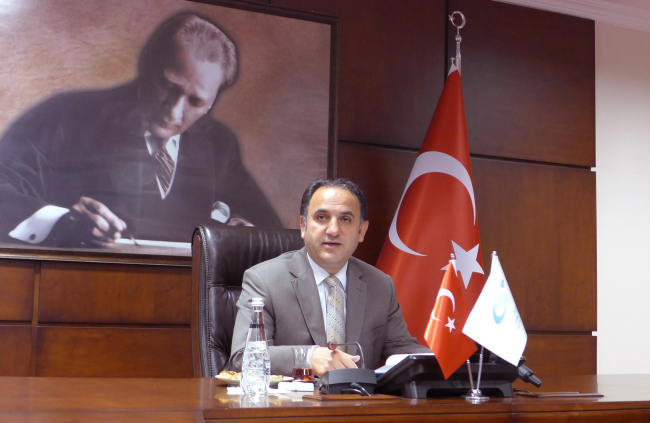 |
Dr. Kudret Bulbul, president and associate professor at the Presidency for Turks Abroad and Related Communities. (Joel Lee / The Korea Herald) |
“We cannot refuse them. We cannot ignore them,” underlined Orhan Sali, chief editor at A Haber broadcasting station. “Turks and Syrians used to live side by side for centuries before the new state border was created in the early 1920s. Syrians are our friends and we will continue to welcome them.”
Sali highlighted that Ankara has spent more than $10 billion over the last five years to integrate the migrants, but received only $200 million from the United Nations. Ankara has developed programs to employ Syrians, including those in the country’s eastern farmlands emptied by Turks for agriculture.
“Most people do not oppose government policies because they know the reality on the streets, with people begging for money and lives destroyed,” Sali said, adding that over 150,000 Syrian babies were born in Turkey since the war.
Rahman Nurdun, an official at the Prime Ministry’s Turkish Cooperation and Coordination Agency (TIKA), echoed the view, saying, “We have decided to help simply because we are fellow human beings. We are not after anything. There are no strings attached.”
TIKA, a national aid agency established in 1992, focuses on institutional, infrastructural and socioeconomic capacity-building around the world. In line with Ankara’s “proactive” foreign policy in international aid, it has bolstered support in education, health, infrastructure, communications, agriculture, environmental protection and emergency humanitarian relief in 50 countries globally.
The institution has aligned its programs with the U.N. Millennial Development Goals starting in 2002, which have turned into Sustainable Development Goals -- a set of intergovernmental objectives with 169 targets, with 2030 in sight. It has offered food aid and agricultural equipment to North Korea under severe drought, on Pyongyang’s request, before this year’s nuclear test.
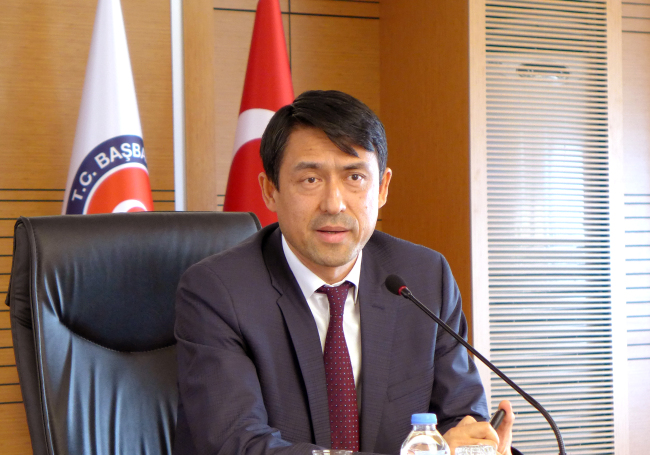 |
Rahman Nurdun, an official at the Prime Ministry’s Turkish Cooperation and Coordination Agency (TIKA) (Joel Lee / The Korea Herald) |
“We expect economic growth with the refugees’ social integration,” said Hamza Tasdelen, deputy president of the Prime Ministry’s Disaster and Emergency Management Authority (AFAD). “Turks and Syrians working together in the same job market will not cause problems, as we used to be neighbors. We currently have an unemployment rate of 11 to 12 percent, but some areas lack the right workforce, so the Syrians will fill the void.”
Around 130,000 Syrians have been given work certificates following vocational training, which allow them to work legally across the country. They are also taught Turkish and other languages in camps. By electing their unit leaders and endorsing grassroots practices, they come to embody the “culture of democracy,” according to Tasdelen.
By Joel Lee (
joel@heraldcorp.com)
 |
Hamza Tasdelen, deputy president of the Prime Ministry’s Disaster and Emergency Management Authority (AFAD). (Joel Lee / The Korea Herald) |

















![[Today’s K-pop] Blackpink’s Jennie, Lisa invited to Coachella as solo acts](http://res.heraldm.com/phpwas/restmb_idxmake.php?idx=644&simg=/content/image/2024/11/21/20241121050099_0.jpg)